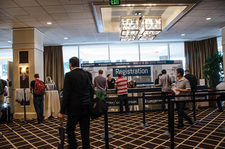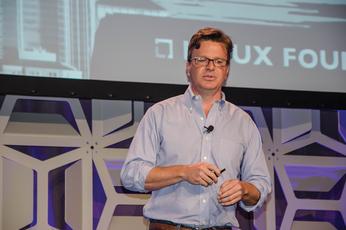LinuxCon North America 2015
Linux Core

The home turf of Microsoft was invaded by Linux enthusiasts for three days of keynotes, talks, and community.
LinuxCon North America [1] met from August 17 to 19 in Seattle, Washington. The event kicked off in typical fashion, with Jim Zemlin, executive director of the Linux Foundation sharing a video, "Distributed Genius: Advancing the Growth of Linux," that showcased how Linux has popularized the culture of collaboration that "can change the world."
In the past few years, the Linux Foundation (LF) has become much bigger than just a body to sponsor the work of core kernel developers like Linus Torvalds. It is now home to many other projects, and the number continues to grow. Zemlin said that in the last few months LF has launched some big projects, including the Node.js Foundation, R Consortium, Cloud Native Computing Foundation, The Open Container Initiative, "… and we are just getting started." In his presentation, he announced two new projects: Kinetic Open Storage, which is backed by Seagate, and the IO Visor project, which aims to advance modern I/O in networking applications.
[...]
Buy this article as PDF
(incl. VAT)
Buy Linux Magazine
Subscribe to our Linux Newsletters
Find Linux and Open Source Jobs
Subscribe to our ADMIN Newsletters
Support Our Work
Linux Magazine content is made possible with support from readers like you. Please consider contributing when you’ve found an article to be beneficial.

News
-
Zorin OS 18 Hits over a Million Downloads
If you doubt Linux isn't gaining popularity, you only have to look at Zorin OS's download numbers.
-
TUXEDO Computers Scraps Snapdragon X1E-Based Laptop
Due to issues with a Snapdragon CPU, TUXEDO Computers has cancelled its plans to release a laptop based on this elite hardware.
-
Debian Unleashes Debian Libre Live
Debian Libre Live keeps your machine free of proprietary software.
-
Valve Announces Pending Release of Steam Machine
Shout it to the heavens: Steam Machine, powered by Linux, is set to arrive in 2026.
-
Happy Birthday, ADMIN Magazine!
ADMIN is celebrating its 15th anniversary with issue #90.
-
Another Linux Malware Discovered
Russian hackers use Hyper-V to hide malware within Linux virtual machines.
-
TUXEDO Computers Announces a New InfinityBook
TUXEDO Computers is at it again with a new InfinityBook that will meet your professional and gaming needs.
-
SUSE Dives into the Agentic AI Pool
SUSE becomes the first open source company to adopt agentic AI with SUSE Enterprise Linux 16.
-
Linux Now Runs Most Windows Games
The latest data shows that nearly 90 percent of Windows games can be played on Linux.
-
Fedora 43 Has Finally Landed
The Fedora Linux developers have announced their latest release, Fedora 43.


